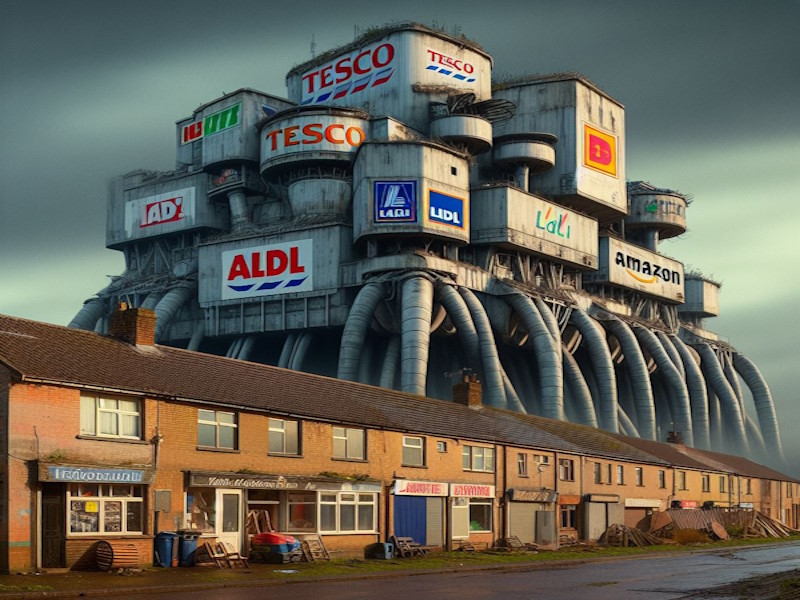The Rise and Rise of the Big Box Retailer:
The Genesis of Monolithic Commerce:
In the late 20th century, a new kind of retail experience began to emerge on the outskirts of towns and cities across the developed world. These "Big Box" retailers, named for their large, warehouse-like buildings, promised consumers convenience, variety, and lower prices under one roof. Companies like Aldi, Lidl, Morrisons, Asda, Sainsbury, M&S and Tesco, etc. led the charge, capitalizing on the growing car culture and suburban expansion.
The BIG BOX RETAILERS
The Aesthetic Dissonance:
These structures, often characterized by their utilitarian design of metal and concrete, stood in stark contrast to the quaint, unique architectures of traditional town centres. Their sprawling parking lots and massive footprints were designed for efficiency and scale, not beauty or community. Yet, they began to proliferate, heralded as symbols of modernity and progress.
The Local Economy Eclipsed:
Erosion of Small Businesses:
As big box retailers planted their roots, the ripple effects on local economies were immediate and profound. Family-owned shops, which had served communities for generations, found themselves unable to compete with the aggressive pricing and vast inventory of these retail giants. The butcher, the baker, the independent bookstore—all struggled to maintain their foothold.
Displaced local Jobs:
The arrival of a big box store was often marketed as a boon for local employment. However, the jobs created were frequently lower-wage positions, lacking the benefits and stability that local businesses traditionally offered. Moreover, the net effect was often negative: for every job created by a big box retailer, multiple jobs were lost in the local economy as small businesses shuttered their doors.
The Decline of High Streets:
Ghosts of Vibrant Past:
High streets, once bustling hubs of commerce and social interaction, began to wither. With the exodus of shoppers to the outskirts, foot traffic in town centres dwindled. Vacant storefronts became a common sight, turning once vibrant streets into desolate reminders of their former selves. The local café where neighbours gathered, and the boutique where personal service was paramount, all became casualties in this retail revolution.
Safety and Social Fabric:
The decline of high streets had social ramifications as well. With fewer people frequenting these areas, they became perceived as less safe. The lack of economic activity led to decreased investment in public amenities and infrastructure, further accelerating the downward spiral. Town centres, once the beating hearts of their communities, were now shadows of their former selves.
The Local Pound’s Disappearance:
The Economic Multiplier Effect:
Local businesses have a unique advantage: they tend to recirculate a higher percentage of their revenue within the community. This phenomenon, known as the economic multiplier effect, ensures that money spent locally continues to benefit the local economy. When a shopper buys a loaf of bread from a local bakery, the baker may spend that money on local services, and so on, creating a virtuous cycle of economic activity.
The Black Hole Effect:
Big box retailers disrupt this cycle. Profits generated by these stores are typically funnelled back to corporate headquarters, often located far from the communities where the profits were made. This siphoning effect deprives local economies of the vital circulation of capital, leading to what can be described as the "black hole effect" where local money effectively disappears from the community, leaving a vacuum in its place.
The Transformation of Town Centres:
A Changing Landscape:
Over the last 30 years, the landscape of town centres has changed beyond recognition. Where once there were bustling markets and diverse, independent retailers, now stand chain stores, if any businesses remain at all. The homogenization of retail has stripped towns of their unique identities, making one town indistinguishable from the next.
The Search for Solutions:
In response to these challenges, some communities have begun to fight back. Initiatives to revitalize high streets through local entrepreneurship, markets, and community events are gaining traction. Policy interventions, such as tax incentives for small businesses and restrictions on new big-box developments, are also being explored. The goal is to reclaim the vibrancy and economic health that town centres once enjoyed.
Reimagining the Future:
The Role of Conscious Consumerism:
Consumers have a crucial role to play in reversing the damage caused by big box retailers. By choosing to support local businesses, consumers can help to revive local economies and restore the social fabric of their communities. Conscious consumerism, where purchasing decisions are made with an awareness of their broader economic and social impacts, is a growing movement that holds promise for the future.
A Vision for Sustainable Communities:
The path forward lies in a balanced approach that recognizes the value of both convenience and community. Sustainable urban planning that integrates big box retailers in a way that complements rather than competes with local businesses is essential. Investments in public infrastructure, local entrepreneurship, and community-building activities can create resilient, vibrant town centres that thrive alongside, rather than in the shadow of, big box retailers.
The Echoes of Change:
The story of big box retailers and their impact on local economies is a cautionary tale. It is a reminder that progress must be measured not just in terms of convenience and cost, but in the health and vitality of our communities. As we move forward, the lessons learned can guide us toward a future where local economies are robust, town centres are vibrant, and the destructive cycle of the past is replaced by a sustainable, inclusive model of growth.


